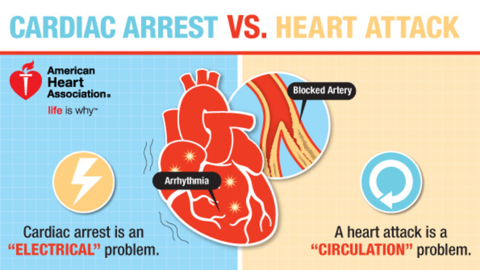October is Sudden Cardiac Arrest Awareness Month

The terms "sudden cardiac arrest" (SCA) and "heart attack" can be easily confused; however, the two conditions are vastly different. October is the month set aside to educate the public on SCA, what causes it, and how it can be prevented.
According to the American Heart Association, SCA is a leading cause of death in the United States and kills more than 350,000 people annually. It is described as an "electrical" problem with the heart, where the heart stops beating properly and can happen to anyone with or without heart issues. It is the main reason you see automated external defibrillators (AEDs) in public places such as schools, shopping malls, convention centers, hotels, and golf courses. An AED is often lifesaving when someone experiences SCA because it sends an electric shock to restore its normal rhythm.
In comparison, during a heart attack, the heart does not stop beating; instead, blood flow to the heart muscle is blocked. Sometimes SCA can occur after or as one recovers from a heart attack.
"It's important to bring attention to SCA because when people have it, they can die from it – often within minutes," said Domingo Gonzalez, MD. "Infants, teenagers, young adults, and those in their 30s and 40s who are seemingly healthy can experience SCA, which is why it's critical to discuss prevention strategies and what do in case of a cardiac emergency."
Ventricular fibrillation, often referred to as v-fib, is the most common cause of SCA and is a type of arrhythmia, a problem with the heart's rhythm. When someone's heart goes in v-fib, the lower chambers quiver and beat irregularly. As a result, the heart pumps little or no blood, depriving the brain and other vital organs.
There are several reasons that someone may experience SCA. These reasons include:
- Ischemic heart disease or plaque buildup in the coronary arteries
- Physical stress, including intense physical activity, lower levels of potassium and magnesium, significant blood loss, or lack of oxygen
- Inherited heart disorders
- Structural changes in the heart from high blood pressure or advanced heart disease
The risk for SCA increases with age is more often seen in men. SCA occurs more frequently in individuals with diabetes, high blood pressure, or chronic kidney disease.
While SCA is not preventable, adopting a healthy lifestyle can lower your risk:
- Eating right
- Maintaining a healthy weight
- Managing stress
- Making time for physical activity
- Not smoking
For more information on SCA, click here to visit the American Heart Association. To schedule an appointment with Dr. Gonzales, visit: https://bit.ly/2FGsOMP
